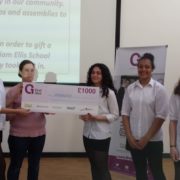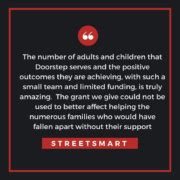We were recently approached by whatCharity who are a platform that helps to connect people to charitable causes by showcasing a host of charities across a wide range of different causes on their website. They help people to find the right causes, show how their donations are used and provide a platform to contribute time, goods and funding to the charities that need them.
For the first week of November, whatCharity are shining the spotlight on homelessness in its varying forms and they were keen to hear from our Director, Vicky Fox. They wanted to know about how different charities help the homeless and what can be done in turn to support those charities working in the fields of both family homelessness and street homelessness.
You can read the full article here which features a series of questions and answers from whatCharity to both Doorstep and The Big Issue Foundation.
Alternatively, you can read Vicky’s responses below:
Who does your charity help? What are some of the reasons for people losing their home?
We work to provide support services to homeless families. The majority of the families that we support are living in one or two rooms in hostels. Conditions can be very cramped with little privacy for family members or space for children to play.
Families can become homeless for a variety of reasons including family circumstances, illness, loss of employment, domestic violence, racial harassment and financial difficulties. Doorstep aims to assist these families by providing goods and services to make their lives more comfortable as they await a permanent housing solution.
What are the roles of the different players in our society when it comes to homelessness?
There is still a lot of stigma attached to being homeless and people often feel very embarrassed about being in that circumstance. It is important to understand that being homeless is not a choice but the end result of a set of life circumstances/events. The role of the government is to address the chronic shortage of social housing and to make the alternative of renting in the private sector within reach of those on low incomes. As well as this, the government needs to provide funding for organisations who are working to support those who are homeless. Individuals can contact charities in their area who are supporting the homeless to see how they can help.
How can individuals and companies help you to help those who are homeless?
Fundraising to help our charity and gifts in kind, of clothing and food are always welcome. You can also donate your time by volunteering. Alternatively, you can contact us to see what exactly what is needed at the time.
You hear about a family being evicted from their home, whether you are a family member, friend or colleague. You are not sure of their circumstances, but you would like to help.
This really depends on the individual circumstances. Housing is the government’s responsibility, so first port of call should be to present themselves to the local council. You also need to bear in mind that local government policy around eligibility might mean that no help will be given. It is important that anyone threatened with eviction does not leave the property before receiving an eviction notice. To leave voluntarily, before receiving an eviction notice, can mean that the local authority decides you are “intentionally homeless” and that they have no duty to you.
Donation/volunteering tips for the public
At Doorstep we receive donations of gently used clothing, toys, books, baby equipment, homeware and more from the wider community, which families attending our centre can help themselves to. You can also enquire at our centre if there are any volunteering opportunities. Many charities have had their funding reduced or as in Doorstep’s case completely withdrawn. This means that charities with limited resources are forced to spend valuable time trying to raise funds to keep their services running. Our whatCharity profile lists many ways you can support us.
To view our whatCharity profile click here









